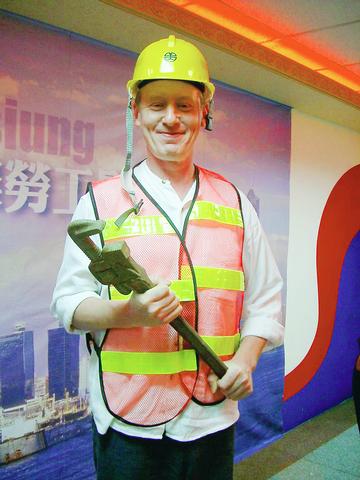For Steve Huison, his role as a British rail track worker in the film Navigator is not just a character he played, but long an issue of concern. The English actor, known internationally as one of the male strippers in The Full Monty, was in Kaohsiung, the city of workers, to join the first International Labor Film Festival yesterday.
Many people likely remember Huison's role as the weakly, unemployed man who tried to commit suicide before Robert Carlye saved him and talked him into joining his comical strip show. But in reality, he is not feeble at all. The son of communist parents, he is not only well-known in film and theater, but a social activist -- a dirty name in Huison's words.
This is perhaps how Huison came to work so closely with renowned filmmaker Ken Loach, who is well-known for his sharp and brilliantly told stories about social concern for the plight of workers. His films include Bread and Roses (1999), My Name is Joe (1998) and Land and Freedom (1995). Loach recently received a nomination for the upcoming 2002 Cannes International Film Festival for his latest work, Sweet 16.

PHOTO: YU SEN-LUN, TAIPEI TIMES
Huison is in Kaohsiung representing Loach's 2001 work, Navigator, as the festival's opening film, and to share the British labor experience with unions in Kaohsiung.
"The film tells a story of real people and real feelings, facing the privatization of state-owned businesses, which is also happening here in Taiwan," Huison said.
Navigator focuses on the privatization of British Rail in 1995. Problems arose when the tracks were divided among different businesses and workers were laid off or forced to adapt to new management. Maintenance costs were cut dangerously low and the ensuing chaos results in the tragic death of a rail track maintenance worker.
Loach's use of a hand-held camera fluently blends black humor with the workers' plight to show the absurdity of privatization.
Also joining the festival as a guest is US documentarian Vivian Price, who has focused on female construction workers around the world. Her film Hammering it Out: Women in the Construction Zone, is a portrait of female construction workers in US. Price said her labor consciousness arose from her own experiences working at construction sites. Price, who has a doctoral degree and is a licensed electrician, said she was fired from one job after another for being a "troublemaker" in the eyes of her employers. She then began filming the plight of female workers.
After arriving Kaohsiung, Price immediately went to local construction sites to film female workers. She said, "I saw the strength in them, some of them have been working for 20 years."
Apart from Hammering it Out and Navigator, there are eight other films showing at the three-day festival which runs from Friday though Sunday. They include Oscar-winner American Dream, a documentary about laborers' struggle with their employer, a famous meat-product packaging company that makes Spam. Also showing is the French documentary Whatever it Costs, about a catering company staffs' struggle with their bosses.
Entrance for all screenings is free. For schedule information visit http://labor.kcg.gov.tw, or call the Cannes Cinema in Kaohsiung at (07) 321-0663.

Taiwan has next to no political engagement in Myanmar, either with the ruling military junta nor the dozens of armed groups who’ve in the last five years taken over around two-thirds of the nation’s territory in a sprawling, patchwork civil war. But early last month, the leader of one relatively minor Burmese revolutionary faction, General Nerdah Bomya, who is also an alleged war criminal, made a low key visit to Taipei, where he met with a member of President William Lai’s (賴清德) staff, a retired Taiwanese military official and several academics. “I feel like Taiwan is a good example of

March 2 to March 8 Gunfire rang out along the shore of the frontline island of Lieyu (烈嶼) on a foggy afternoon on March 7, 1987. By the time it was over, about 20 unarmed Vietnamese refugees — men, women, elderly and children — were dead. They were hastily buried, followed by decades of silence. Months later, opposition politicians and journalists tried to uncover what had happened, but conflicting accounts only deepened the confusion. One version suggested that government troops had mistakenly killed their own operatives attempting to return home from Vietnam. The military maintained that the

Jacques Poissant’s suffering stopped the day he asked his daughter if it would be “cowardly to ask to be helped to die.” The retired Canadian insurance adviser was 93, and “was wasting away” after a long battle with prostate cancer. “He no longer had any zest for life,” Josee Poissant said. Last year her mother made the same choice at 96 when she realized she would not be getting out of hospital. She died surrounded by her children and their partners listening to the music she loved. “She was at peace. She sang until she went to sleep.” Josee Poissant remembers it as a beautiful

Before the last section of the round-the-island railway was electrified, one old blue train still chugged back and forth between Pingtung County’s Fangliao (枋寮) and Taitung (台東) stations once a day. It was so slow, was so hot (it had no air conditioning) and covered such a short distance, that the low fare still failed to attract many riders. This relic of the past was finally retired when the South Link Line was fully electrified on Dec. 23, 2020. A wave of nostalgia surrounded the termination of the Ordinary Train service, as these train carriages had been in use for decades